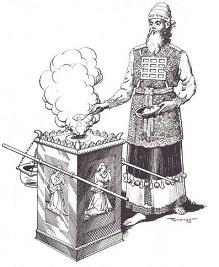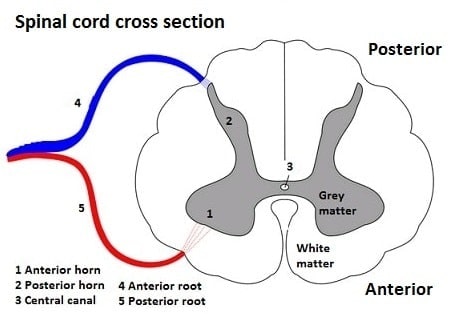A Clear Conscience
(Part 17 of the Cleansing of the Sanctuary Series)
In any cleaning we do it is necessary to be able to see the dirt. In cleansing our personal sanctuary (our minds), the conscience plays a large role in identifying to us what requires cleansing.
The conscience is actually part of our flesh. It occupies a physical part of our brain and was included in God’s design of our physical make up. Although the word “conscience” never appears in the KJV version of the Old Testament, here is one reference to it:
“The sin of Judah is written with a pen of iron, and with the point of a diamond: it is graven upon the table of their heart, and upon the horns of your altars;” (Jer 17:1)
The conscience was designed by God for our protection much like the capacity to feel pain enables us to take protective action to minimize physical injury. It is hard to ignore pain in our body. Likewise, a guilty conscience can get our attention:
“And he said, Who art thou, Lord? And the Lord said, I am Jesus whom thou persecutest: it is hard for thee to kick against the pricks.” (Acts 9:5)
This was the message to Paul when he was involved in persecuting Christians, forcing them against their will and restricting personal freedom.
The Action of the Conscience
Bible uses of “conscience” indicate different roles:
- to warn of potential spiritual danger
- to react as soon as possible against temptation
- to prompt us to seek help in overcoming during trial
- to seek healing from spiritual injury
- to encourage us when it is clear
1. To Warn of Potential Spiritual Danger
This is based on our knowledge of right and wrong pointing out the necessity of educating ourselves in the ways of God. We need to recognize that all God’s laws are there for our good and our protection, not for God’s benefit. That is the difference between natural, design law and imposed, arbitrary law. See more on the difference here.
Our conscience helps us to know not to look at that, not to say that, not to go there etc. The conscience will even operate in people (unless they have consciously suppressed it to the point they can no longer hear its “voice.”) who do not know God’s law if they have accepted its principles in their heart:
“For when the Gentiles, which have not the law, do by nature the things contained in the law, these, having not the law, are a law unto themselves: Which shew the work of the law written in their hearts, their conscience also bearing witness, and their thoughts the mean while accusing or else excusing one another;)” (Rom 2:14-15)
“Their thoughts” would be thoughts activated by their consciences. How can the Gentiles (some of them) have the law written in their hearts when God is proposing to write His law in the heart of “His people” implying it is not yet written there? Are there Gentiles, who don’t have the law, ahead of God’s people in terms of having an appreciation of its principles? Could the law in the heart be much more a matter of living by its principles than it is of knowing its details? Christians need to ask themselves that question.
2. To React as Soon as Possible
This is equivalent to pulling our hand away from a hot stove.
In the human mind there are “horns.” The spinal cord descends from and is part of the brain. The spinal cord has extensions at the back and front connecting to nerves. They are called, in medical terminology, the posterior and anterior horns. There are horns in your nervous system and in your brain.
 The “horns of your altars” (Jer 17:1) is a reference to the altar of incense with its horns:
The “horns of your altars” (Jer 17:1) is a reference to the altar of incense with its horns:
“And the priest shall put some of the blood upon the horns of the altar of sweet incense before the LORD, which is in the tabernacle of the congregation …” (Lev 4:7)
That altar is in the first apartment of the sanctuary which may correspond to our conscious mind. Sins were “recorded” in the sanctuary on the horns of the altar. Similarly, sins are recorded in our conscious mind from where we need to take the action to repent of and forsake them. Even the dangers of temptations, as they come to our awareness, need to be dealt with by sending up a prayer (symbolized by the incense) for help rather than falling to the temptation.
Perhaps that altar corresponds to the function of our conscience? I think there is much more to understand about the connection between the sanctuary, its apartments, furnishings and our mind or sanctuary. (Please let me know of further insights that could be added.)
It is interesting that the word for table in these two verses is from the same original word:
“The sin of Judah is written with a pen of iron, and with the point of a diamond: it is graven upon the table (H3871) of their heart, and upon the horns of your altars;” (Jer 17:1)
“And the LORD said unto Moses, Come up to me into the mount, and be there: and I will give thee tables (H3871) of stone, and a law, and commandments which I have written; that thou mayest teach them.” (Exo 24:12)
What is written (“graven”) on the table of the heart (conscience) is recorded there because of our perception of our actions in relation to what was graven or written on the tables of the law.
“And the tables were the work of God, and the writing was the writing of God, graven upon the tables.” (Exo 32:16)
Horns Represent Power
In Bible prophesy, horns represent power. This is what your spinal cord and your brain is to the rest of your body. The posterior and anterior horns are where you perceive the sensation of touch. The sensing nerves send a message of sensation into the posterior horn and a return message of reaction goes from the other horn to react. The reception of and reaction to the message goes through those horns.
 So in situations such as touching a hot stove, the nervous system is designed to react very quickly to protect us from injury without us even having to make a conscious decision. We don’t think “my finger is getting very hot, I smell burning flesh, perhaps I should take my finger off the stove.”
So in situations such as touching a hot stove, the nervous system is designed to react very quickly to protect us from injury without us even having to make a conscious decision. We don’t think “my finger is getting very hot, I smell burning flesh, perhaps I should take my finger off the stove.”
We want our conscience to have similar power to make right decisions without us thinking about it; we should not even consider the advantages of yielding to temptation. Train your will to choose right because it is right. The will is the governing power in the nature of man. It is the deciding power which we must always use to keep us on God’s side.
3. To Prompt Us to Seek Help
The conscience calls upon us to make a choice. When you are faced with a moral decision, you can choose right or wrong. Many will simply default to what is easy. We need to activate willpower to bring to mind the choices and their consequences and reason out which is the better option.
If we do this, it can become easier. Perhaps that is why it is called willpower which is defined as:
“control of one’s impulses and actions; self-control.” (Dictionary.com)
Help is Promised
There are many promises of help when facing decisions or temptations. When our conscience prompts us of danger it can also prompt us (especially if we make a habit of connection the two) to call upon God’s promises for help.
“And thine ears shall hear a word behind thee, saying, This is the way, walk ye in it, when ye turn to the right hand, and when ye turn to the left.” (Isa 30:21)
“In all thy ways acknowledge him, and he shall direct thy paths.” (Pro 3:6)
“There hath no temptation taken you but such as is common to man: but God is faithful, who will not suffer you to be tempted above that ye are able; but will with the temptation also make a way to escape, that ye may be able to bear it.” (1 Cor 10:13)
4. To Seek Healing from Spiritual Injury
This verse could be speaking of spiritual injury; injury to the mind:
“Unto the pure all things are pure: but unto them that are defiled and unbelieving is nothing pure; but even their mind and conscience is defiled.” (Titus 1:15)
The conscience looks for and perhaps we could say suggest to us that we should do something about it. Have you ever had your conscience say to you:
- You should apologize for that
- You should make that right
- You would feel better about yourself if you …
We have surely all experienced that sort of thought and perhaps have often not listened to it which only makes the hurt deeper. It is helpful to understand that our conscience is there for our good:
“Which shew the work of the law written in their hearts, their conscience also bearing witness, and their thoughts the mean while accusing or else excusing one another;” (Rom 2:15)
If we understand that, and cooperate with Jesus, He can purge or cleanse our conscience:
“How much more shall the blood of Christ, who through the eternal Spirit offered himself without spot to God, purge your conscience from dead works to serve the living God?” (Heb 9:14)
“Purge” is from the Greek katharizo (G2511) which is most often translated as “cleanse” and from which we get “catharsis.”
 There are many emotions that come from a defiled conscience that need cleansing:
There are many emotions that come from a defiled conscience that need cleansing:
- Shame – I am to blame, I was foolish
- Fear – of being discovered, of loss as a result of a wrong done
- Fear – of natural consequences which are already happening – fear itself is a consequence
- Fear – of imposed penalties
- Feelings of estrangement
- Feelings of condemnation – I deserve some form of punishment
- There is a sense that there is a record somewhere else, other than in my conscience. Someone else knows what I have done – gulp!
- A sense of conflict between my actions and my beliefs and values.
5. To Encourage Us When it is Clear
To have a conscience clear of all guilt would be a wonderful feeling and would greatly help us draw closer to God:
“And hereby we know that we are of the truth, and shall assure our hearts before him. For if our heart [conscience] condemn us, God is greater than our heart, and knoweth all things. Beloved, if our heart condemn us not, then have we confidence toward God.” (1 John 3:19-21)
The word “confidence” is translated form the same original word rendered “boldly” in this verse:
“Let us therefore come boldly unto the throne of grace, that we may obtain mercy, and find grace to help in time of need.” (Heb 4:16)
Do you feel boldness before God now? If not, understand that it is possible by having a clear conscience. That includes having the knowledge that God does not condemn us for past wrongs.
The Conscience and Brain Function
Brain research looking at the roles of different parts of the brain has shown that when our consciences are clear, we can reason and think more efficiently. But when we are involved in activities that defile the conscience we cannot think or reason as well. Clear thinking requires a clear conscience.
God, through our conscience, seeks to warn us off the path of sin. But when we refuse to listen, because He honors our free will, He backs off. God never forces obedience. Heed the warnings of your conscience and your brain will even work better.
Why Not a Verbal Warning?
God does not force obedience and He does not sanction others forcing obedience to His laws either. If His warnings to us were audible, it might induce others to put pressure on us not to do something. And so, He speaks to us individually – through the conscience. It is through the nerves of the brain that God communicates to man to affect his life.
That non-verbal warning also protects us from the embarrassment of exposure to others. A good example of that is the story of Simon the Pharisee. Simon, in his mind, was condemning the woman anointing Jesus’ feet as a great sinner when he had considerable sin of his own. Jesus’ gentle rebuke spoken by a parable (Luke 7:40-47) was designed to give a message without exposing Simon’s sins before his dinner guests.
A Guilty Conscience Hurts
A conscience can be activated by certain actions:
“If thine enemy be hungry, give him bread to eat; and if he be thirsty, give him water to drink: For thou shalt heap coals of fire upon his head, and the LORD shall reward thee.” (Pro25:21-22)
The probable or hoped-for reaction from the enemy would be something like: “He is being so kind to me; I should have treated him better.” It causes mental suffering, likened to the effects of hot coals.
The final suffering and destruction of the lost at the end of the millennium will likewise consist mainly of the effects of a guilty conscience. This is described for the case of Satan himself:
“Thou hast defiled thy sanctuaries by the multitude of thine iniquities, by the iniquity of thy traffick; therefore will I bring forth a fire from the midst of thee, it shall devour thee, and I will bring thee to ashes upon the earth in the sight of all them that behold thee.” (Eze 28:18)
For a detailed description of this process see the e-book The Lake of Fire.
Focus Where the Problem Is
Too often we focus on the acts of sin not realizing that it is the sinful tendencies in our heart that lead to the sinful acts. And going further towards the ultimate source of our problem, as discussed in earlier parts of this series, it is our concept of God’s character that leads us to think and then act as we do. We tend to become like the concept of God we hold in our minds.
“But we all, with open face beholding as in a glass the glory of the Lord, are changed into the same image from glory to glory, even as by the Spirit of the Lord.” (2 Cor 3:18)
This is Part 17 of the Cleansing of the Sanctuary Series
Return to Daniel 8:14 (the master page of the series) to continue
